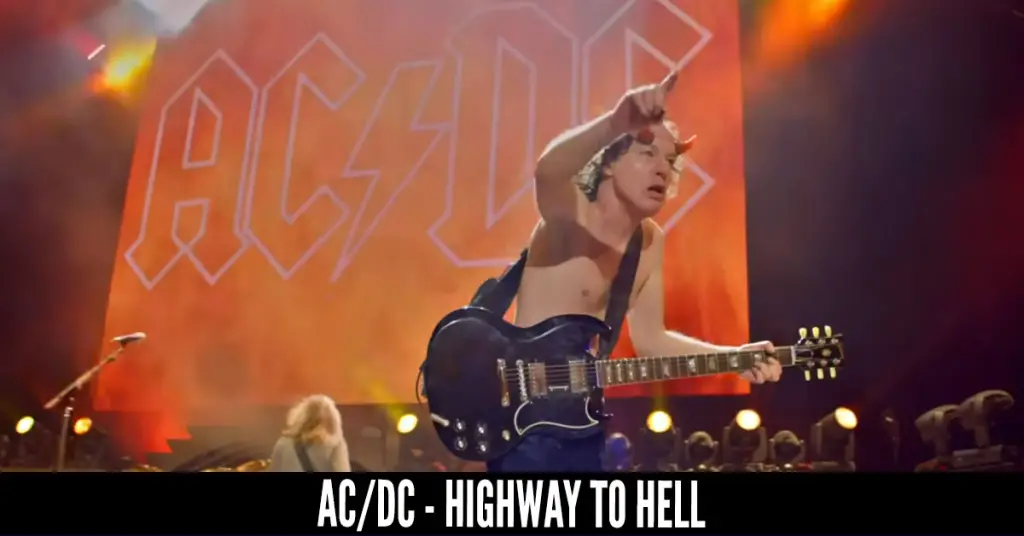When AC/DC unleashed “Highway to Hell” in 1979, they weren’t just releasing a rock song—they were paving a permanent road into the heart of rock ‘n’ roll history. It’s loud, rebellious, unrelenting—and above all—unapologetic.
With its no-holds-barred attitude, monster riff, and the final recorded vocals of the late, great Bon Scott, “Highway to Hell” isn’t just an anthem for rockers—it’s a battle cry for anyone who refuses to play by the rules.
The Last Ride with Bon Scott
“Highway to Hell” is the title track of AC/DC’s sixth studio album and the final album featuring Bon Scott, whose raspy, whiskey-soaked vocals turned every line into a sermon from the wild side. Just months after its release, Scott would tragically die from alcohol poisoning in early 1980.
But what a final statement he left behind. On “Highway to Hell,” Scott doesn’t sound like he’s going anywhere quietly. He’s laughing, snarling, strutting straight into the flames, middle finger raised. It’s pure rock defiance, delivered with charm, swagger, and zero remorse.
“Hey mama, look at me / I’m on my way to the promised land…”
It’s not just a song—it’s a declaration.
The Riff That Rules the Road
That iconic riff? It’s Angus Young at his best—simple, searing, and completely unforgettable. With Malcolm Young’s granite-solid rhythm guitar behind him, the song’s structure is classic AC/DC: tight, lean, and impossible not to move to.
Producer Mutt Lange, brought in for the first time on Highway to Hell, helped sharpen the band’s sound without losing its raw edge. He added just enough polish to make it radio-friendly, but kept the danger intact. The result? A song that sounds just as thunderous in a stadium today as it did in a sweaty club in ’79.
Lyrics: A Devil-May-Care Declaration
Despite the controversy the title stirred up at the time (and it stirred up plenty), “Highway to Hell” isn’t an ode to satanic worship—it’s a metaphor for life on the road, especially the hard-living, soul-draining grind of constant touring.
“No stop signs, speed limit / Nobody’s gonna slow me down…”
It’s about freedom. About pushing forward without compromise. About living fast, hard, and loud. It’s AC/DC’s version of a mission statement—and they never strayed from it.
Cultural Impact and Legacy
Upon release, “Highway to Hell” became the band’s first major international hit, cracking the Top 20 in the UK and gaining serious traction in the U.S.—where it helped break AC/DC into mainstream consciousness.

Today, it’s one of the most iconic rock songs of all time, regularly featured on “greatest songs” lists and still blasting from stereos, arenas, and sporting events worldwide. It’s been covered by artists across genres and immortalized in film, video games, and countless tributes to the glory of loud guitars and louder living.
It’s also become a staple of the band’s live set—often used as an opener or encore—bringing the crowd to a fever pitch every time that first riff hits.
Final Thoughts
“Highway to Hell” is everything rock ‘n’ roll should be: dangerous, exhilarating, simple, and unforgettable. It’s not just a song—it’s a feeling. It’s a lifestyle. It’s the roar of an engine, the scream of a solo, the smirk of a rebel.
And it was just the beginning.
After Bon Scott’s tragic death, the band could have fallen apart. Instead, they honored his legacy by releasing Back in Black with Brian Johnson, sealing their fate as rock gods.
But no matter where the road took them, they’ll always be riding down that highway, amps cranked to 11.
Because if there’s one thing AC/DC taught us, it’s this:
Rock and roll ain’t noise pollution.
It’s freedom.
And this is its national anthem.


Facebook Comments